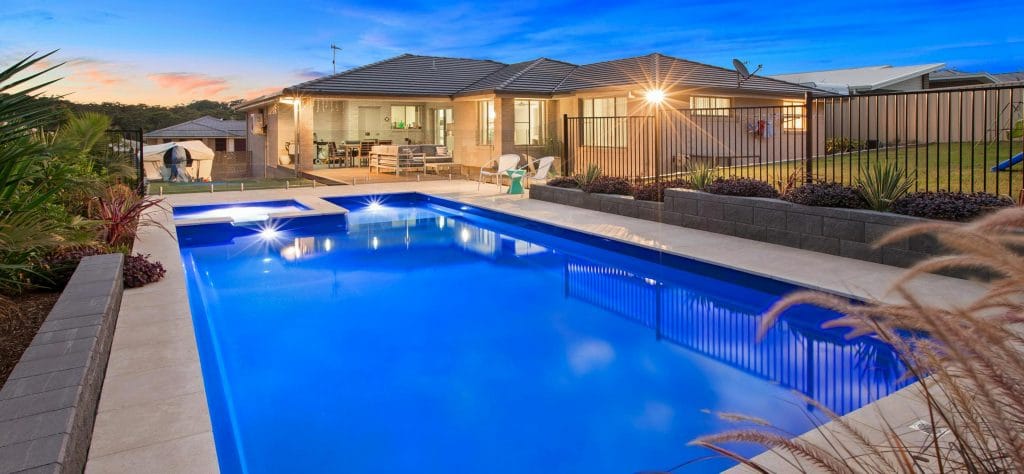What's the best way to heat a swimming pool?
Are you struggling to work out which pool heating system is going to be best for your individual circumstances? The reality is that many different factors need to be taken into consideration when working out which pool heating system to opt for. Some of the key considerations to think about include:
- Is a constant temperature required all year round?
- Will you be using your pool at night or early in the morning?
- How big is your pool?
- Is your pool covered, or open-air?
- Is it a commercial or a private (residential) pool?
The type of heating system that’s going to be best for your needs will vary depending on your specific circumstances.
What are the different types of pool heating systems?
Solar Pool Heating
Usually used alongside other heat conservation measures such as covering the pool overnight, solar heating relies on the sun’s rays to heat your water. A pump draws the pool water into the solar collectors, where it’s heated using the sun’s energy. The warmed water is then pumped back into the pool.
Advantages
- FREE source of power
- Environmentally friendly
- Low running costs
- A solar pool system maintains its heat during the warmer months
Disadvantages
- Your pool is only warm when the sun shines
- It can take a long time for the pool to heat up initially
- More expensive to install than gas or electricity
- Durable. Most solar pool systems will last a decade or two
Solar heating is a good option for smaller pools, residential pools, or families who prioritise environmental considerations and/or running costs.
Gas Pool Heating
A gas pool heater works in much the same way as any other gas heating system. The gas burns, releasing heat. Water is pumped into copper pipes, which pass through the combustion chamber. As the water passes through the pipes, it’s heated. The warm water is then pumped back into the pool.
Advantages
- Fast heating action
- Can be used all year round
- Quiet to run
- Relatively inexpensive to purchase
Disadvantages
- Comparatively expensive to run, especially given the recent rise in energy prices
- Not environmentally friendly
- Not particularly long-lasting in comparison with solar systems
If you only use your pool heating occasionally and don’t want to spend out on a pricey system, gas pool heating can work really well.
Electric pool Heating
The most common form of electric pool heating is a heat pump. The pump draws warm air from the atmosphere and runs it over some evaporator coils. The warm air warms the liquid inside the coils, turning it into a warm vapour. The vapour is compressed (making it hotter), then the hot gas returns to the condenser, where it gives its heat over to the pool water. The process is then repeated until the pool is at the right temperature.
Advantages
- Environmentally friendly
- Cheap to run
- Very safe
- Low maintenance
Disadvantages
- Expensive to purchase initially
- Difficult to install
- May not always generate sufficient heat during the cooler months
Electric pool heating is ideal for families wanting a heater with low energy requirements.
Which type of pool heating system should I choose?
When it comes to heating your swimming pool, there is a range of factors to take into consideration. Every pool owner has different needs that will affect which heating system they opt for. When deciding how to heat your pool, it is important to consider everything from when your pool will be used to the energy prices in your area. The following paragraphs provide a guide to what factors you should think about before choosing your pool heating system.
Think about these factors before making your decision:
Your geographical location
Your geographical location plays a role in the heating of your swimming pool. If your swimming pool is in direct sunlight, it is likely that the Australian summer sun will go a long way to warming the water. This means that you are unlikely to need as powerful a heater for your pool.
Pools located in cooler climes or shaded areas, however, are likely to need a stronger heating system to warm the water to a comfortable temperature.
What size pool are you looking to install?
Take into consideration the size of your swimming pool when choosing a heating system. The bigger your pool, the more energy is needed to heat the water, so a fast-acting and powerful heating system is best. Smaller pools will heat up quicker with less power, so often only require smaller heating systems.
Your chosen heating system should indicate which size pool it works best with, so use this as guidance when making your decision.
What are the energy prices where you live?
Heating your swimming pool is going to raise your energy bills – but hopefully not by too much! When deciding which type of heating system to install, consider the energy prices where you live and the possibility of price increases in the future.
An electric pool heating system can be low cost, however, you risk facing steep increases in bills at a later date. Instead, why not opt for solar-powered heating to harness the sun as a completely free energy source?
Do you want a warm pool or just the chill taken off the water?
Your chosen heating system is likely to impact the temperature that your pool’s water reaches. Take into consideration whether you prefer a warm pool or are happy with just the cool edge taken off. A gas heating system is best for year-round warm water, however, this can be a costly and inefficient option.
Whilst solar-powered heating can take longer to warm your pool’s water to the optimum temperature, it will keep your water at a comfortable temperature. This makes it a potentially more cost-effective and sustainable option for those who prefer a warmer swim.
Do you want to swim year-round?
If you plan on using your pool all year round, you will need to choose a heating system that accommodates this. During the winter months, you will need more power to heat your pool’s water, which will have a knock-on effect on your electricity bills.
A solar-powered heating system can provide valuable energy during the summer months, however, this option may struggle to generate enough power to warm your pool during the winter. Perhaps opt for a gas heating system to ensure comfortable swimming during the colder season.
Who will be using your pool?
Consider who will be using your pool when choosing which heating system to install. Children who are eager to jump in and start swimming may find waiting for the water to heat up to be frustrating, so choose a gas system for fast heating.
When it comes to safety, an electric or solar-powered system is best, and both require little maintenance. This may be a selling factor for those who wish to rent out their property to holiday-makers.
There are many other factors you will need to think about
Alongside those listed above, there are many more factors to consider when choosing your swimming pool’s heating system. It is best to sit down and discuss your unique needs with your family before making a final decision.
Want to learn more about which pool heating system is right for your home?
If you live in the Port Macquarie area and are still wondering which pool heating system is right for you, our team can help you make the right choice.
Call us today on 02 6581 3232 or contact us online to get in touch with a member from our trained team!


